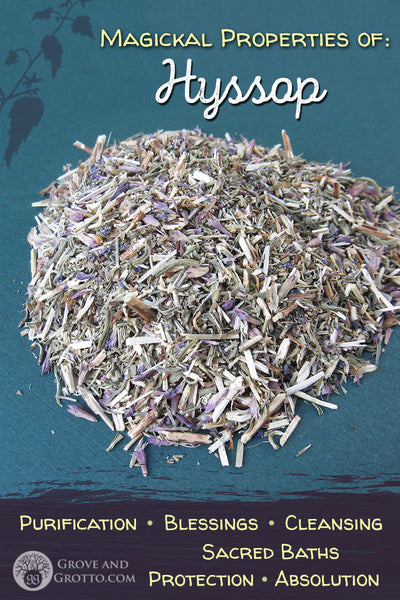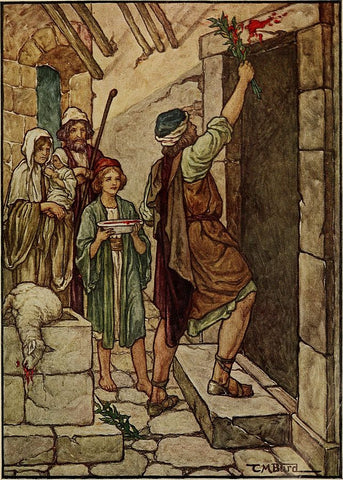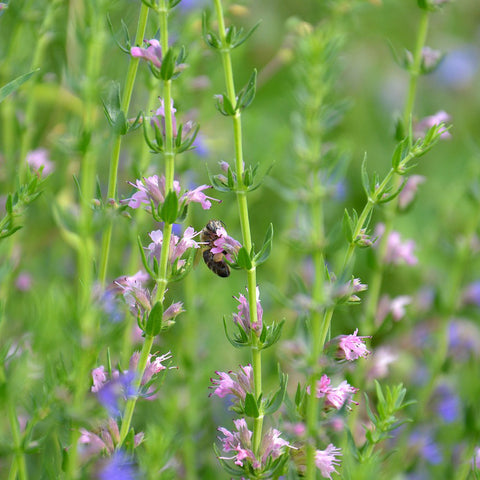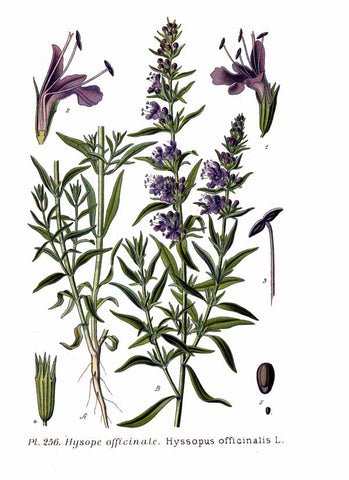
As lovely a garden plant as you’re ever likely to find, Hyssop is a small shrub related to Mint. It is sweet-smelling and easy to grow, with beautiful flowering tops. The flowers may be blue, purple, pink or white. Gardeners plant it in flowerbeds to attract hummingbirds, butterflies, and bees.
Hyssop is used in herbal medicine as an antiseptic and a cough reliever. Its medicinal properties have been written about since ancient times. The Romans drank Hyssop-infused wine as a digestive aid.
French country cooking makes occasional use of Hyssop as a roasting herb or salad topping. The aromatic leaves make a flavorful addition to broths and teas. The herb is also an ingredient in the famous herbal liqueurs Chartreuse and Benedictine. Oil of Hyssop adds a sweet, herbaceous note to perfumery. (Some say it’s similar to Lavender.)
Hyssop is one of the most ancient of ritual herbs. It has been used for millennia for cleansing and consecration. It is native to Southern Europe. Hyssop is mentioned several times in the Bible. The best-known of these references is David’s prayer in Psalm 51:7: “Cleanse me with Hyssop, and I will be clean; wash me, and I will be whiter than snow.” In the Middle Ages, Hyssop was recognized as a peerless strewing herb. The presence of Hyssop was thought to repel plague and bring purity to the home.
Witches who work with Hyssop have several options. Cut and sifted Hyssop can be found at magickal shops and some health food stores. If you live in a temperate climate, growing your own bed of Hyssop is a wonderful option. The leaves are loaded with aromatic oils and can be used fresh or dried. (The flowers only fresh—their fragrance is faint.)
Hyssop essential oil is also available. The scent is said to stimulate creativity and aid in meditation. (Always dilute, and do not ingest. Hyssop oil contains chemicals that can affect the circulatory and nervous systems.)
Commercially grown Hyssop usually comes from one species, Hyssopus officinalis. There are other non-related plants, including wild Verbena, that go by the common name Hyssop.
Magickal uses of Hyssop

Hyssop’s holy reputation can be traced back to its Biblical endorsements. In Leviticus, God commands his people to purify the temple using Hyssop. It is a brush made from Hyssop that the Hebrews use to protect themselves from the Angel of Death at Passover. And the Gospel of John tells us that Christ takes his last drink from a sponge attached to a Hyssop branch. It’s no surprise that Christians in Europe ascribed great power to this humble garden herb.
Even among present-day Witches, magickal uses for Hyssop tend to revolve around purification. Dried Hyssop may be infused in floor washes or ritual baths, or scattered around the home. In Sicilian magick, Hyssop is used in protective charms to avert the Evil Eye. Most other traditions consider Hyssop to be a cleansing herb—more purifying than strictly protective. It is used to clear away sins, regrets, and worries that are blocking one’s spiritual progress.
Hyssop has a very particular use in American folk magick: To “wash away” the stain of negative spells. A Hyssop bath is a follow-up step to performing a curse or jinx. The Hyssop is said to cleanse inside and out, absolving the magick worker of any guilt. (It’s good for dry skin and hair, to boot.)
If you don't have Hyssop on hand, resourceful Witches have been known to substitute another cleansing herb (or combination of herbs). Rosemary, Mint, and Sage are all cousins of Hyssop and can do the job in a pinch. However, some rootworkers swear by Hyssop alone, and won't make any substitutions for it.
Correspondences

Hyssop is an herb of great antiquity. It has a wise, benevolent energy, fresh fragrance, and it propagates readily. The usual planetary attribution for Hyssop is Jupiter. Crowley tells us Hyssop “is Jupiterian on account of its religious use in lustration.”
This works out very well, because Hyssop is specifically linked to the sky-god Jehovah. (Agrippa attributes Hyssop to the Moon, perhaps due to its camphoreous scent and white-flowered varieties.)
What about the elemental correspondence? Many sources go with Fire because of Hyssop’s powerful cleansing energy. But Hyssop looks, smells, and acts more like an Air herb to me. It’s a pleasant and gentle plant without any really Fiery qualities. Hyssop’s history as an early air freshener (and its reputation for boosting mental acuity) nudge it further into the Air column.
Spells and formulas with Hyssop

Steep Hyssop in oil or blessed water. Sprinkle some drops on people, places, or things that need to be purified.
Carry Hyssop in your pocket to prevent unkind thoughts and energy from sticking to you.
Add Hyssop tea to the bath as an uncrossing remedy. If you’re the one who’s crossed someone, the ritual bath will wash away the bad juju and leave you squeaky clean. Dispose of everything you used in the hex properly before making the Hyssop bath. Scrub your hands and body while reciting the 51st Psalm (“Wash me with Hyssop…”).
Hyssop tea is a comforting and uplifting drink that can accompany any type of purification magick.
Combined with Rue, Hyssop makes a fine protective charm for the home. Some Witches tie sprigs of Hyssop to the besom to sweep away negativity.
Use an infusion of Hyssop to cleanse ritual tools, especially when acquiring used items for your altar.
Precautions
Hyssop is a kitchen herb. It’s safe for most people to use in normal food quantities.
Concentrated forms are another story. Hyssop contains thujone and potentially toxic ketones. Never take the essential oil internally. Doing so has been known to cause convulsions and seizures. Consult a doctor before using if you have high blood pressure or are pregnant or nursing. Also use caution if you have allergies to any Lamiaceae family plants (Basil, Mint, Rosemary, etc.)
Scent Profile: Sweet, Grassy, Camphoreous, Herbaceous, Fresh
Correspondences: Jupiter, Air
Occult properties of herbs are provided for historical interest only, and no outcome is guaranteed. Nothing on this website should be taken as medical or legal advice. Please use herbs responsibly.
Search our shop for Hyssop products, or browse more articles.
